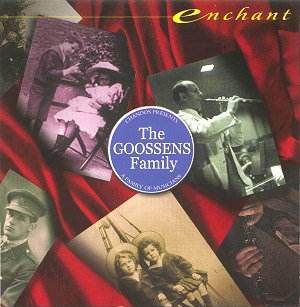The Goossens Family.
[61.18]
J.S.BACH (1685 -
1750)
1.Easter Oratorio. "Sinfonia"a
[5.23]
Lord J.P.SOMERS-COCKS (1907 - 1995)
2."Three Sketches". Sketch No 1*
[2.44]
Walter STANTON (1891 -
1978)
3."Chanson Pastorale"* [3.54]
Alan RICHARDSON(1904 -
1978)
4."Scherzino"* [1.56]
Sir George HENSCHEL (1850 -
1934)
5."Shepherd's Lament"*
[5.34]
Thomas B. PITFIELD (1903 -
1999)
6."Rondo lirico"* [2.45]
Herbert HUGHES (1882 -
1937)
7."Bard of Armagh"* [3.55]
Thomas F. DUNHILL (1877 -
1946)
8.Three Short Pieces "Romance"*
[2.45]
William BOYCE (1711 -
1779)
9."Matelotte"* [2.53]
Gerald FINZI (1901 -
1956)
10.Interlude for Oboe and String Quarteta
[12.21]
Michael KREIN
(?)
11.Serenade for Oboe and Two Harps**
[4.23]
Morgan NICHOLAS (1903 -
1983)
12."Melody" (transcribed by Marie Goosens) **
[3.10]
Max SAUNDERS (?)
13."A Cotswold Pastoral"a
[5.07]
Sir Edward ELGAR (1857 -
1934)
14.Soliloquy for Oboe & Orchestra (orch. Gordon Jacob)b
[4.00]
 Leon Goossens (oboe), David
Lloyd (piano)*
Leon Goossens (oboe), David
Lloyd (piano)*
Marie and Sidonie Goossens (harps)**
Fitzwilliam String Quartet a
Bournemouth Sinfoniettab / Norman del
Marb
Recording dates and details are not currently
available.
 CHANDOS CHAN 7132
CHANDOS CHAN 7132

This new release from Chandos has been given a slightly misleading title
"The Goossens Family - a family of musicians". True though the statement
is, a better description of the disc is the one on the rear insert " The
Art of Leon Goossens" as he is featured on each piece and dominates the CD
with his two sisters, Sidonie and Marie in minor roles. Brother Eugene is
referred to but does not appear anywhere in the recordings.
Leon was a magnificent oboeist - without doubt the best Britain produced
and arguably supreme on the world stage. His success was built upon a base
of superb technique - he began playing as a child and had his own instrument
by the age of ten - and his father who was conductor of the Carl Rosa Orchestra
arranged lessons for him with top professional players of the day. On top
of this soundest of bases was Goossen's own innate artistry and feel for
the music along with his very distinctive and beautifully produced tone that
seemed to be his almost as a birthright. The notes remind us of Goossens
car accident which badly damaged his teeth and lower lip. This caused a three
year break from public appearance and the subsequent elimination of the cor
anglais and oboe d'amore from his repertoire due to the heavier reeds in
them being too taxing .
The majority of pieces on the disc have Goossens with piano accompaniment
(excellent support from David Lloyd here) as in a recital, and of the writers
only William Boyce would be an easily recognisable name. The others are
barely-known British composers and the works are mainly of the English pastoral
school - pleasant and appealing but instantly forgettable. The perky
Scherzino by Alan Richardson and Boyce's Matelotte at the end
of the group with two hornpipes framing a slower central interlude made welcome
contrasts. Their grouping in sequence was a weakness and a more varied order
on the recording would have helped.
The only extended item was Gerald Finzi's Interlude for Oboe and String
Quartet and it is undoubtedly the pick of the bunch. It is a substantial
piece with some splendid string writing and an emotional range - at times
elegiac, then turbulent - that keeps the listener enthralled. The oboe is
part of a coherent, unified work and the slightly unusual balance was handled
well in the recording. The same combination in the J.S.Bach Sinfonia
and the Max Saunders piece showed again the potential in this grouping.
The contribution by the harp playing sisters, Marie and Sidonie came in a
charming Serenade by Michael Krein and the simply titled Melody
by Morgan Nicholas in which the sinuous oboe line is et against the minimal
harp support. The closing track - a Gordon Jacobs arrangement of an Elgar
piece - was a four minute delight.
Of Leon Goossens himself, faultless playing throughout with and a ravishing
tone and subtle nuances - just as he will be remembered. This is a recording
to dip into for reminders of one of the great performers heard here in some
pleasant trifles.
Reviewer.
Harry Downey

